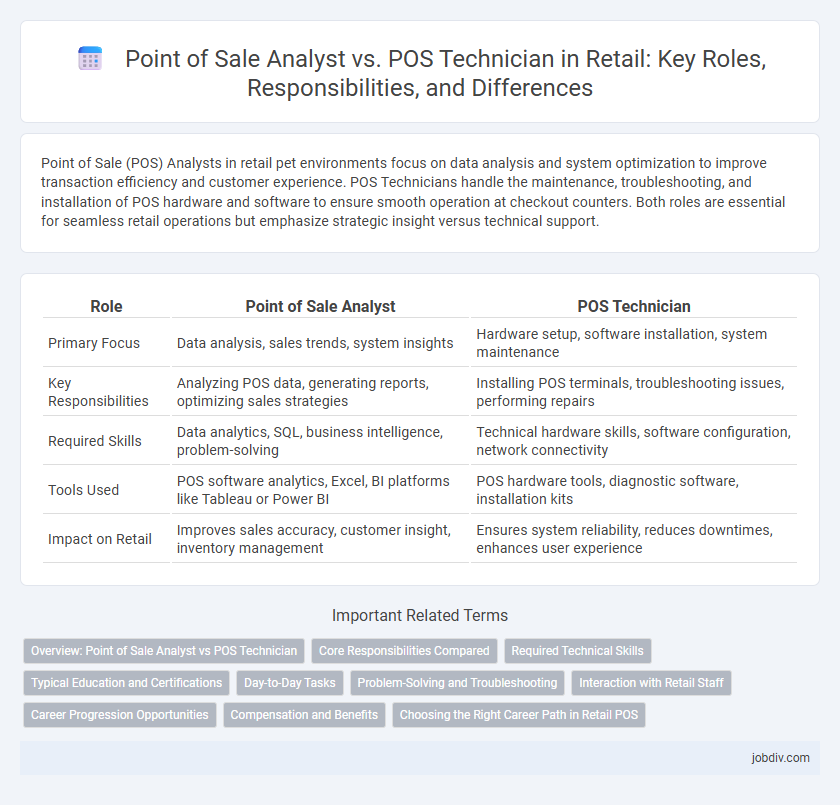Point of Sale (POS) Analysts in retail pet environments focus on data analysis and system optimization to improve transaction efficiency and customer experience. POS Technicians handle the maintenance, troubleshooting, and installation of POS hardware and software to ensure smooth operation at checkout counters. Both roles are essential for seamless retail operations but emphasize strategic insight versus technical support.
Table of Comparison
| Role | Point of Sale Analyst | POS Technician |
|---|---|---|
| Primary Focus | Data analysis, sales trends, system insights | Hardware setup, software installation, system maintenance |
| Key Responsibilities | Analyzing POS data, generating reports, optimizing sales strategies | Installing POS terminals, troubleshooting issues, performing repairs |
| Required Skills | Data analytics, SQL, business intelligence, problem-solving | Technical hardware skills, software configuration, network connectivity |
| Tools Used | POS software analytics, Excel, BI platforms like Tableau or Power BI | POS hardware tools, diagnostic software, installation kits |
| Impact on Retail | Improves sales accuracy, customer insight, inventory management | Ensures system reliability, reduces downtimes, enhances user experience |
Overview: Point of Sale Analyst vs POS Technician
Point of Sale Analysts specialize in analyzing sales data and optimizing retail performance through detailed reporting and trend identification in POS systems. POS Technicians focus on maintaining, troubleshooting, and repairing hardware and software components of the POS infrastructure to ensure seamless transaction processing. Both roles are critical in enhancing the retail experience, with Analysts driving strategic decisions and Technicians ensuring operational reliability.
Core Responsibilities Compared
A Point of Sale (POS) Analyst focuses on analyzing sales data, optimizing transaction processes, and identifying trends to improve retail performance, relying heavily on data interpretation and software reporting tools. In contrast, a POS Technician is responsible for the installation, maintenance, and repair of POS hardware and software systems, ensuring that terminal operations remain smooth and uninterrupted. Both roles are crucial for retail efficiency but differ significantly in their core responsibilities: analytical data management versus technical system support.
Required Technical Skills
A Point of Sale Analyst requires expertise in data analysis, software proficiency in retail management systems, and strong problem-solving skills to optimize transaction processes and sales reporting. In contrast, a POS Technician needs hands-on technical skills in hardware troubleshooting, system installations, network connectivity, and maintenance of POS terminals and peripherals. Both roles demand familiarity with POS software, but Analysts focus on leveraging data insights while Technicians prioritize system functionality and technical support.
Typical Education and Certifications
Point of Sale Analysts typically hold a bachelor's degree in business, information technology, or a related field, and often pursue certifications such as Certified Analytics Professional (CAP) or Certified Business Analysis Professional (CBAP) to enhance data analysis skills. POS Technicians usually require a high school diploma or associate degree in electronics, computer technology, or IT support, with certifications including CompTIA A+, Microsoft Certified Solutions Expert (MCSE), or vendor-specific POS system training. Education and certifications for Analysts emphasize data interpretation and business intelligence, while Technicians focus on hardware troubleshooting, software installation, and system maintenance.
Day-to-Day Tasks
A Point of Sale (POS) Analyst focuses on analyzing sales data, identifying transaction trends, and optimizing system operations to enhance retail performance. A POS Technician handles the installation, maintenance, and troubleshooting of POS hardware and software to ensure continuous functionality during business hours. While the Analyst interprets data for strategic decisions, the Technician addresses technical issues and system upgrades on the shop floor.
Problem-Solving and Troubleshooting
A Point of Sale Analyst leverages data analytics and software expertise to identify patterns and resolve complex transaction errors, enhancing system efficiency through strategic problem-solving. In contrast, a POS Technician specializes in hardware and software troubleshooting, performing hands-on repairs and maintenance to ensure seamless operation of POS terminals. Both roles require strong diagnostic skills, but the Analyst focuses on data-driven solutions while the Technician manages physical system functionality and immediate technical issues.
Interaction with Retail Staff
Point of Sale Analysts work closely with retail managers and staff to analyze sales data and improve transaction efficiency, providing actionable insights for optimizing store performance. POS Technicians focus on maintaining and troubleshooting POS hardware and software, ensuring minimal downtime and seamless customer checkouts. Effective interaction between both roles and retail staff enhances operational continuity and sales effectiveness in retail environments.
Career Progression Opportunities
Point of Sale (POS) Analysts typically advance into roles such as Business Intelligence Specialist or Retail Operations Manager by leveraging data analysis skills to optimize sales performance and customer experience. POS Technicians often progress toward Technical Support Lead or Systems Integration Specialist positions by deepening their expertise in hardware maintenance and software troubleshooting within retail environments. Both career paths offer growth opportunities, with Analysts focusing on strategic insights and Technicians emphasizing technical infrastructure enhancement.
Compensation and Benefits
Point of Sale Analysts typically receive higher compensation due to their specialized skills in data analysis, reporting, and optimizing sales strategies, often earning between $60,000 and $85,000 annually. POS Technicians generally earn $40,000 to $60,000, reflecting their technical expertise in hardware maintenance and troubleshooting rather than strategic insights. Benefits for both roles often include health insurance, paid time off, and employee discounts, but analysts may have additional incentives like performance bonuses and professional development opportunities.
Choosing the Right Career Path in Retail POS
A Point of Sale (POS) Analyst focuses on analyzing sales data, optimizing transaction processes, and improving customer experience through software insights, requiring strong analytical and technical skills. In contrast, a POS Technician specializes in installing, maintaining, and repairing POS hardware and software systems, demanding hands-on technical expertise and troubleshooting abilities. Choosing the right career path depends on whether you prefer data-driven strategy development or technical support roles within the retail POS environment.
Point of Sale Analyst vs POS Technician Infographic

 jobdiv.com
jobdiv.com